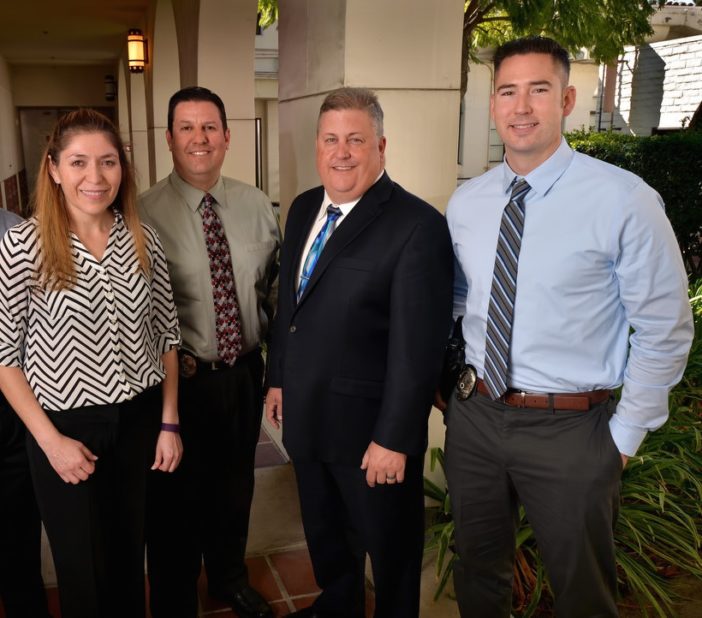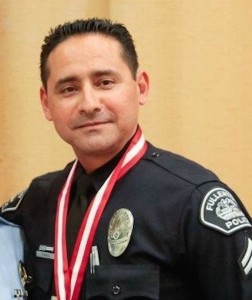Professional Standards Bureau – Training and Personnel doesn’t sound like the most exciting gig for a cop.
But this critical unit at the Fullerton PD serves as the gatekeeper of everyone who gets hired and who doesn’t — from sworn officers to cadets to professional staff members. The unit also is in charge of making sure all FPD employees are up to date on a dizzying amount of regularly required training.
It’s a huge and important job.
For example, should an issue ever arise down the road with an FPD employee, one of the first things inquiring minds (i.e., a private attorney or deputy district attorney) will subpoena is the employee’s training records.
Which makes Sgt. Dan Castillo and his team of four colleagues on the unit feel a heightened sense of responsibility every day they report to work.
On Castillo’s team are Cpl. Donny Blume, who handles personnel (he conducts a lot of interviews; most background investigations are sent out to a private company); Cpl. Jose Torres, who handles training; and civilian employee Patricia Arevalo, the training administrative assistant who lives in a world of Excel spreadsheets to keep the trains running on time.
A part-time cadet also is assigned to the unit, which is overseen by Lt. Andrew Goodrich.
Castillo’s unit is in charge of personnel and training. Two other FPD sergeants handle internal affairs, which falls under the umbrella of the Professional Standards Bureau.
Castillo, 44, transferred to the FPD as a cop in October 2003 from the Cal State Fullerton PD, which he joined in 2001.
Prior to that, he served as a reserve officer with the Monterey Park PD, from 1998 to 2001.
Castillo’s background is teaching.
He became interested in law enforcement while attending Cal State Fullerton and working as a student employee for the campus police, but upon graduating there was a hiring freeze in law enforcement so he opted, instead, to became a teacher.
For seven years, Castillo taught at Whittier High School and Cerritos High School. He taught health, PE and math; was the athletic director at Whittier High School for two years, and coached football and baseball.
Castillo, who is married with three children (all boys, ages 11, 16 and 18), comes from a family of teachers. His mother was a teacher; so were his step-mother and father. And his wife teaches elementary school in Tustin.
At the FPD, Castillo worked as a patrol officer from 2003-2008, and also as a field training officer.
His favorite assignment, he said, was working as a detective on the Family Crimes Unit, from 2008 to 2011.
Castillo also worked for nearly two years on an FBI Safe Team Taskforce, working child porn and human trafficking cases that had a connection to Fullerton.
***
On a recent weekday, Castillo was reviewing two background investigations – he reads them all before sending them to Lt. Goodrich, who sends them up to Capt. Scott Rudisil.
One of the background reports was on an officer recruit starting the Orange County Sheriff’s Regional Training Academy in May; the other is for a college student applying for the position of cadet.
Castillo, who works four 10-hour shifts a week, also has a few collateral duties.
He’s in charge of the FPD jail, and recently began overseeing the CSI unit. He also has a hand in supervising the Property Division.
Castillo says he couldn’t do his job without Arevalo, who has the daunting task of making sure all FPD employees — not just its nearly 150 sworn officers — are current on required POST (Peace Officer Standards and Training) classes.
“I’m always working on a lot of different stuff at the same time,” says Arevalo, who is going on six years in her current position.
For example, when an officer is reassigned — say, to traffic — he or she has to enroll in certain courses, and it’s Arevalo’s job to make sure that happens.
And every two years, officers have to brush up on what are known as “perishable skills,” such as driving, first aid/CPR, communication and shooting skills.
Castillo’s unit is also in charge of making sure the FPD’s policy manual is up to date.
For example, the End of Life Option Act, which goes into effect June 9, has implications for police officers throughout the state. In summary, the new law says if someone is terminally ill, he or she can end his or her life by taking a deadly combination of pills prescribed by a doctor, but he or she has to ingest the medication on his or her own.
Castillo ran the new law by superiors, and they decided that instead of making adding a new policy it would be classified as a training issue. Officer will be educated about the new law so they will know what questions to ask on certain death investigations.
Castillo was asked what the FPD looks for in prospective employees: “We want someone who’s personable and outgoing and not afraid to take the initiative. We’re a pretty proactive department.”
 Behind the Badge
Behind the Badge




